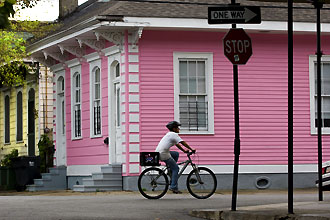Paving the Way for New Bike Lanes
The census isn't the only counting project in town. Drivers on St. Charles Avenue and other byways may have noticed investigators from the Tulane Prevention Research Center counting cyclists and pedestrians. The results will be shared with city planners and transportation officials to aid in decision-making about future bike lane projects.

The Tulane Prevention Research Center is evaluating how much New Orleanians bike and walk on city streets. (Photo by Paula Burch-Celentano)
Observations are taking place in neighborhoods across New Orleans uptown, downtown, Lakeview, Mid-city and the Upper 9th Ward on streets that are targeted to receive bike lanes as well as other streets without planned bike-lane installation, for comparison purposes.
The Tulane Epidemiology Department in partnership with the Prevention Research Center received a one-year, $150,000 Robert Wood Johnson Foundation Rapid Response grant for the evaluation project.
Approximately 45 miles of new bike lanes will be constructed on Crescent City streets linking residential neighborhoods to commercial corridors, thanks to post-Katrina funding for resurfacing roads.
Researchers will examine the impact of constructing bike lanes on cycling through structured observations of cyclists and pedestrians on city streets both before and after bike lanes are constructed.
"This grant allows us to study the impact of environmental improvements on activity as they are happening," says Jeanette Gustat, principal investigator of the project. "We will be able to determine whether the number of people cycling increases, and if new bike lanes attract new riders or pedestrians to places where new lanes are present."
Improvements in physical activity infrastructure could have a major positive impact on the health of New Orleanians, where 24.4 percent of adults are obese and 28.6 percent of adults are overweight.
"People are more physically active in neighborhoods that are designed for walking and bicycling," says Kathryn Parker-Karst, study coordinator. "New Orleans' flat terrain and temperate climate make it ideal for year-round bike riding."
Lisa Hoffman is communications and training coordinator in the Prevention Research Center of the School of Public Health and Tropical Medicine.
